- Home
- James A. Michener
Sayonara: A Novel
Sayonara: A Novel Read online
Sayonara is a work of historical fiction. Apart from the well-known actual people, events, and locales that figure in the narrative, all names, characters, places, and incidents are the products of the author’s imagination or are used fictitiously. Any resemblance to current events or locales, or to living persons, is entirely coincidental.
2014 Dial Press Trade Paperback Edition
Copyright © 1953, 1954 by James A. Michener
All rights reserved.
Published in the United States by Dial Press Trade Paperbacks, an imprint of Random House, a division of Random House LLC, a Penguin Random House Company, New York.
DIAL PRESS and the HOUSE colophon are registered trademarks of Random House LLC.
Originally published in hardcover in the United States by Random House, an imprint and division of Random House LLC, in 1954.
eBook ISBN 978-0-8041-5144-3
www.dialpress.com
v3.1
Sayonara is a sad and final word:
“And you, Japan, you crowded islands, you tragic land—sayonara, you enemy, you friend.”
Contents
Cover
Title Page
Copyright
Chaplain Feeney: “It’s your duty as well as mine to prevent such a marriage.”
Joe Kelly: “G.I.’s married to Jap girls always look as if they knew a big, important secret.”
Mrs. Webster: “I don’t mean the Japanese are inferior, but I do mean we ought to remember who won the war.”
Eileen Webster: “I could never consent to live the barren life your mother did.”
The Big Girl: “It’s no fun to be a Stateside reject watching cute Japanese girls getting all the American men.”
Mike Bailey: “As a Marine I have certain theories which explain everything.”
Katsumi-san: “Japanese like gold teeth but I get white one for Joe.”
Fumiko-san: “When Japan know America win, my father kill himself—honorable—Japanese style.”
The Woodcarrier: “Japanese girls nice to kiss—yes?”
Old Farmer: “Each drop of fertilizer I place against the stalk of the plant by hand—not to waste any.”
Easy Lessons in English, 1879: “Ever your devoted and humble servant.”
First Officer’s Wife: “American men buying underwear for Jap girls always look so pathetic.”
Buddhist Monk, 1794: “This bell we received as a gift from the girls of Yoshiwara.”
Lt. Col. Calhoun Craford: “You goddamned nigger-lover.”
General Gruver: “Say, do you think the Japanese can be trusted after we go home?”
Watanabe-san: “You pull this lever and the steel ball shoots up there and falls back down.”
Consular Report: “Eskivan, Peter. Mother says, ‘No damned good.’ ”
The Curator: “It Is unlikely that even one foreigner in all our history has truly understood Japan.”
Teruko-san: “These wonderful little girls work desperately to learn the steps—the way Hana-ogi once did.”
Pharmacist’s Mate: “In Kobe there’s this guy who can straighten her eyes for eight bucks.”
Hana-ogi: “Not soap In tub, Rroyd-san. Outside soap, please.”
The Noodle Vendor: “Soba, soba, soba.”
Osaka Girl to Marine on Leave from Korea: For Japanese dancing Hana-ogi now ichi-ban.
Cpl. Sharkey: “You damned Buddha-heads, you gotta stand back from the door.”
General Webster: “Whatever makes you a better man makes you a better husband.”
Dedication
Other Books by This Author
About the Author
CHAPLAIN FEENEY: “It’s your duty as well as mine to prevent such a marriage.”
On April 4, 1952, I shot down my sixth and seventh MIGs. It happened up near the Yalu River and when I returned to base at J-10 I was excited. The Air Force doctor took one look at me and said, “Gruver, you’ve had it.”
Boy, they were sweet words. They meant I was through flying for a while. But since I’m a West Point man I felt obligated to appear eager before the flight surgeon who had been called back from civilian life, pot belly and all. So I frowned and said, “Nothing wrong with me, Doc. A bottle of beer’ll fix me up.”
“That’s right,” the doc agreed.
He had taken my eagerness seriously and for a minute I felt a little sick inside. I didn’t want to fly any more. Not just then. I wanted to appear rough and ready but I also wanted some solid chairborne duty.
But the doc was smart. He laughed and said, “Don’t turn pale, Gruver. I was only kidding. I never take this hero stuff seriously.”
I relaxed and said, “Thanks. I could use some Korean sleep.”
“It’s even better than that,” Doc said, putting away his stethoscope. “You’re going back to Japan!”
From the way he said this you knew he thought Japan was paradise, but I’d been through the place and it never impressed me much. Dirty streets, little paper houses, squat men and fat round women. I had never understood why some Air Force people got so steamed up about Japan.
I said, “If you go for Japan, I suppose it’s good news. I’d just as soon rest up right here at J-10.”
Doc said, “You mean you never tangled with any of those beautiful Japanese dolls at Tachikawa?”
I said, “I’m a four-star general’s son. I don’t tangle with Japanese dolls, beautiful or not.”
Doc looked at me sorrowfully and said, “Chum, you’re sicker than I thought.”
I hadn’t meant to sound stuffy, but when you know your outfit sort of has you ticketed for fast promotion right through to colonel and maybe one-star general by the time you’re thirty-five, a lot of the ordinary razzle-dazzle connected with military life doesn’t impress you. On the other hand, I had always tried not to act superior to reserve officers just because they were civilians at heart.
I said, “I’ll think of you, Doc, when I hit those clean Tokyo sheets and that good Tokyo beer.”
He shook his head with a tricky little leer and said, “For you, Chum, it ain’t gonna be Tokyo. For you … special orders.”
Like a warning flash and without my actually thinking the word I blurted, “Kobe?”
“Yep, Chum! You made it.”
Instinctively I put my left hand on my hip and felt for my wallet. I said, “About these special orders? Were they from General Webster?”
“Yep, Chum! You’re in.” He gripped his hands in a tight little ball and winked at me. “Why wouldn’t one general look after another general’s son?”
I had always known the doc to be a second-class sort of guy and I refused to be drawn into an argument. I played his game and said, “It’s what they call the West Point spirit.”
“That’s what I mean,” the doc said. “Kelly has your orders.”
“I’ll go see Kelly,” I said, glad to get away from this know-it-all civilian.
But as I left the medical tent and started down the gravel path to squadron headquarters where Kelly worked, another civilian called me: “Gruver, could I speak with you?”
I turned and saw the chaplain and since he almost never spoke to anyone except about trouble I stopped short and asked, “Kelly again?”
“Yes,” he said almost sorrowfully. “Kelly.”
I waited on the gravel path while he picked his way across the brown Korean mud. J-10 was almost all mud. When he joined me I asked. “What’s he been up to now, Padre?”
“This time it’s serious,” he said sorrowfully. He led me to his tent, a beat-up affair with Bibles, crucifixes and the special silver gadgets for conducting Jewish ceremonies.
“Kelly face another court-martial?” I asked.
“Worse. He’s a
ppealed to his Congressman.”
I’d always been disgusted with enlisted men who write letters to Congressmen. The Air Force had a sensible and just way to handle any problem. Congressmen weren’t needed. So I asked, “Why don’t you advise the colonel to throw this guy out of the service?”
“Under the new rules …”
The new rules! I was always forgetting the new rules. Starting in 1945 a lot of soft-headed do-gooders in Washington had revised the basic rules for military conduct and as a result you now saw enlisted men writing to Congressmen. I had always agreed with my father. Knock such stoops on the head and throw them in jail. Then the do-gooders could really sob.
“So under the new rules, what happens?” I asked.
“So Kelly gets his way. He goes back to Japan.”
“Ridiculous,” I said. “The Air Force is becoming a kindergarten.”
“And when he gets back to Japan, he marries the girl.”
This was too much. I sat down in one of the padre’s rickety chairs and asked, “You mean that in spite of all you and the colonel have said to this kid he still gets permission to marry the girl?”
“That’s right.”
“Why doesn’t somebody bust him in the head?”
“That’s no solution. I want you to talk with him.”
“Nothing more I can say.”
“Does the boy realize that if he marries this Japanese girl he can’t possibly take her back to America?” the padre asked.
“Sure he knows. I made him sign the paper proving that he knows. He signed and told me what I could do with it.”
“You must talk with him once more, Gruver. He’s a misguided boy.”
“He’s a dead-end criminal, Father, and you know it.”
“Not a criminal! A tough boy who’s had trouble in the Air Force. He’s just hot-headed.”
“That’s not where the heat is, Padre.”
He laughed and said, “You’re right. That’s why we mustn’t let him make a fool of himself.”
I was tired from flying and said bluntly, “Look, Padre. Kelly belongs to your church. You’re the guy who’s got to save him.”
Chaplain Feeney became very serious and took my hands in his. It was a trick he used when he wanted to make a point and it accounted for much of his success with the squadron. He was never afraid to plead with a man. “You must believe me when I say I’m not trying to save Kelly for my church. I’m trying to save him for himself. If he marries this Japanese girl it can lead only to tragedy. In ordinary times such a marriage would be unwise, but under the new law … when he can’t even take her with him to America … What’s to happen, Gruver?”
He spoke so passionately that I had to give in. “All right. What do you want me to do?”
He was embarrassed at what he was about to suggest and hesitated a moment. Then he said, apologetically, “You’re engaged to a fine, good-looking American girl. You showed me her picture one night.” He smiled as I automatically reached with my left hand for my wallet pocket. “When you’re flying and things begin to get rough you pat that picture for good luck, don’t you?”
I said I did. It was a gimmick I had picked up when I shifted from propeller planes to jets. Like most pilots, I was scared of the jets at first so whenever it looked like trouble I would pat my wallet for luck, because Eileen Webster had been good news for me ever since that special week-end I met her in San Antonio.
Chaplain Feeney said, “If the opportunity presents itself, show Kelly your girl’s picture. Let him remember what a fine American girl looks like.”
I said, “I’m not selling anything.”
The padre was a smart man. “Who asked you to?” he said. “When he says he’s determined to get married tell him you understand. Tell him you’ve seen some really wonderful Japanese girls.”
“Trouble is, Padre, I haven’t. They’re all so dumpy and round-faced. How can our men—good average guys—how can they marry these yellow girls? In ’45 I was fighting the Japs. Now my men are marrying them.”
“I’ve never understood it. Such marriages are doomed and it’s my job to prevent them.”
“I agree.”
“Then you’ll speak to Kelly?”
“Wouldn’t it be simpler for the colonel just to order him not to get married?” I asked.
Chaplain Feeney laughed. “Some things can’t be handled that way. We’ve investigated the girl Kelly wants to marry. She’s not a prostitute. She’s not subversive. As a matter of fact, she got a good recommendation from our investigators. Used to work in a library. Kelly has a right to marry her.”
The word marry caught me strangely and I was swept back four years to a spring week-end in Texas when a gang of us left Randolph Field for a big time in San Antonio. We were walking down some stone steps to an open-air theater by the river that runs through the middle of San Antonio, when suddenly I saw this beautiful girl coming up. I did a double take and cried, “Aren’t you General Webster’s daughter?” And she gave me a dazzling smile and said she was and I stood right there staring at her and asking, “Why didn’t you look like this when you lived across from me in Fort Bragg?” and she said she’d always looked like this but I had been too busy going away to the Point to notice. I tried to recall but couldn’t even remember her clearly from those days so I said, “You must have been a long-legged kid of eleven when we were at Fort Bragg.” Then she said something which stopped me cold. She ignored the other Air Force men standing beside me and said, “I’m still a long-legged kid.” And she was right and eighteen days later we sort of made up our minds to get married. But Eileen’s mother and Korea took care of that.
So I brought myself back to Korea and told Chaplain Feeney, “I’ll do what I can.”
“Thanks, Gruver.” As I started to go he asked, “Mind if I speak to the colonel about you?”
“What for?”
“You’re as tense as a watch spring, son. I’m going to tell the old man you ought to be grounded.”
I laughed and said, “The doc beat you to it. I’m on my way to Japan.”
“Wonderful,” he said. “Tokyo?”
“No, Kobe. My girl’s father is general down there.”
“That’s fortunate.”
“It has its drawbacks.”
“I mean Kelly is going to Kobe, too. You can keep an eye on him.”
I was disgusted. “You mean you’re flying him back to where the girl is?”
“His Congressman insists on it.”
I started to say what I thought of Congressmen who butt into military affairs like this but the padre said, “You might save the boy.”
I thought of mean, sawed-off Joe Kelly and said as I left, “Nothing could save that bum.”
JOE KELLY: “G.I.’s married to Jap girls always look as if they knew a big, important secret.”
It was a curious day in Korea. Our air base at J-10 wasn’t what you’d call warm, but there was a shot of spring in the air and the ground was beginning to thaw and even Korea felt pretty much the way any part of the world feels in spring. I took a couple of good deep lungfuls of air and walked down headquarters street, a dismal drag even with spring nibbling at its edges, and I said to myself, “Skip Kelly. Let him take care of himself.”
I headed for my bunk, where there would be some beer and a poker game, but then I realized that Kelly had the hot dope on my orders, so I went into the squadron tent where I found this mutt sitting behind a hand-painted sign big enough for a general: AIRMAN KELLY.
He was a runty kid in his teens. I was twenty-eight and everybody younger than that seemed immature, but Kelly really was. He’d never been to school but had a quick animal intelligence and a sort of gutter know-how. He’d come up through a tough section of Chicago and had sandy hair and an up-with-your-dukes Irish face. He was against the world and against all officers in particular. He had the weird record of having been promoted to corporal four times—and busted back each time. He was bitter and always in trouble and t
he last man in our outfit you would expect to get involved seriously with any girl.
He shoved my orders at me and said, “Pays to have friends.”
I had been responsible for one of Kelly’s court-martials, but he had astonished me on the second by requesting me as his counsel. He respected no one, but he did like men who flew the jets. When he jammed the papers at me I was going to haul him up again, but he grinned and said, “Hear you bagged two more today.”
“Boom, boom.”
“How was it up there, Ace?”
“Never gets easier.”
“You know what’s in your orders?” he asked in a snide way that a gangster might use in asking about a pay-off.
“Kobe,” I said, picking them up.
“Yeah, but I mean how you happened to get them?”
“I’ve never discussed things like orders with enlisted men,” I said, turning for the door.
Kelly was different. He said, “What I mean is, did you know about General Webster writin’ to the colonel?”
It was infuriating. I wanted to bust this little twerp in the face but he kept me on the hook. I hesitated and said, “They’re friends.”
“Sure, but these letters were about you.”
“Me?”
“Yeah, General Webster started all his letters, ‘Of course I don’t intend to intrude on your handlin’ of the squadron but …’ He always got the but in.”
“But what?”
“But he would sure like to have Major Lloyd Gruver come right the hell down to Kobe.”
I stuffed the papers into my pocket and said, “I didn’t ask for orders like that.”
Kelly laughed in an ugly way and said, “You ain’t heard nothin’ yet, Ace.” He seemed to despise me for being an officer yet to tolerate me because I was a working pilot. He said, “General Webster’s had you assigned to the Interservice Aviation Board, which means you sit on your parachute all day long and do nothin’.” Then he grinned and added. “But oh them nights.”
“What nights?”
Kelly poked his blunt little head in one direction then the other and asked, “Ace, can you keep a secret?”

 Mexico
Mexico The World Is My Home: A Memoir
The World Is My Home: A Memoir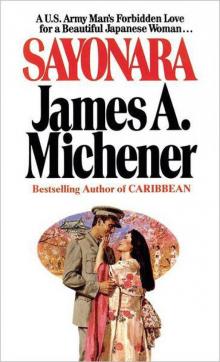 Sayonara
Sayonara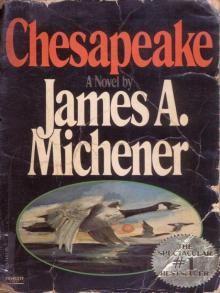 Chesapeake
Chesapeake The Novel
The Novel Rascals in Paradise
Rascals in Paradise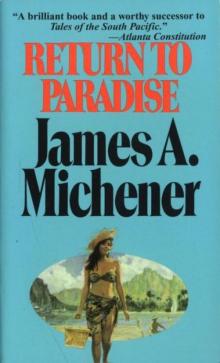 Return to Paradise
Return to Paradise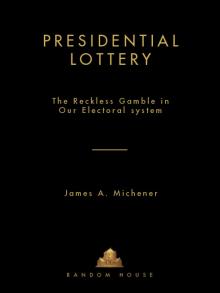 Presidential Lottery: The Reckless Gamble in Our Electoral System
Presidential Lottery: The Reckless Gamble in Our Electoral System The Source
The Source Poland
Poland Space
Space Caravans
Caravans Creatures of the Kingdom: Stories of Animals and Nature
Creatures of the Kingdom: Stories of Animals and Nature Iberia
Iberia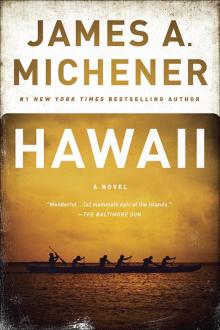 Hawaii
Hawaii The Watermen: Selections From Chesapeake
The Watermen: Selections From Chesapeake Report of the County Chairman
Report of the County Chairman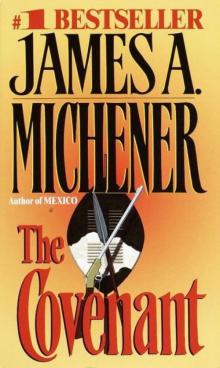 The Covenant
The Covenant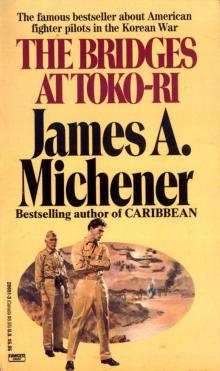 The Bridges at Toko-ri
The Bridges at Toko-ri Matecumbe
Matecumbe Journey: A Novel
Journey: A Novel Centennial
Centennial Sports in America
Sports in America Texas
Texas Miracle in Seville
Miracle in Seville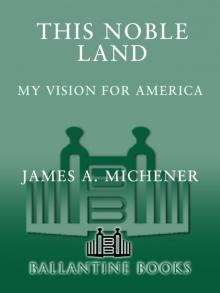 This Noble Land: My Vision for America
This Noble Land: My Vision for America Tales of the South Pacific
Tales of the South Pacific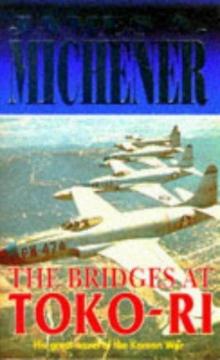 Bridges at Toko-Ri
Bridges at Toko-Ri Space: A Novel
Space: A Novel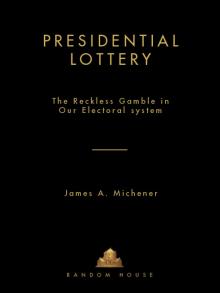 Presidential Lottery
Presidential Lottery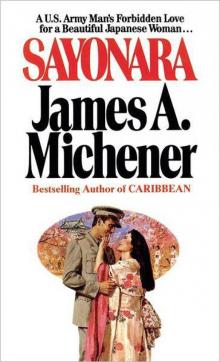 Sayonara: A Novel
Sayonara: A Novel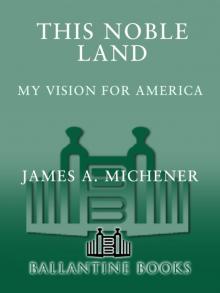 This Noble Land
This Noble Land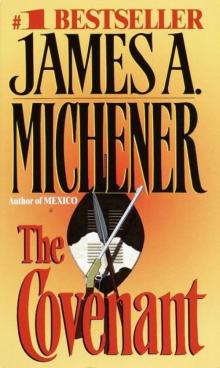 The Covenant: A Novel
The Covenant: A Novel Miracle in Seville: A Novel
Miracle in Seville: A Novel The Bridge at Andau
The Bridge at Andau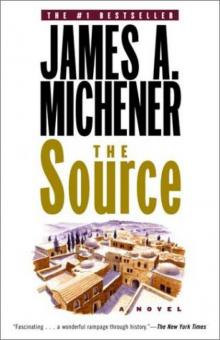 Source
Source The Source: A Novel
The Source: A Novel Journey
Journey Recessional: A Novel
Recessional: A Novel Legacy: A Novel
Legacy: A Novel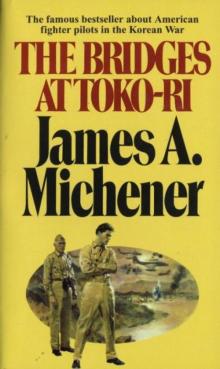 The Bridges at Toko-Ri: A Novel
The Bridges at Toko-Ri: A Novel Poland: A Novel
Poland: A Novel